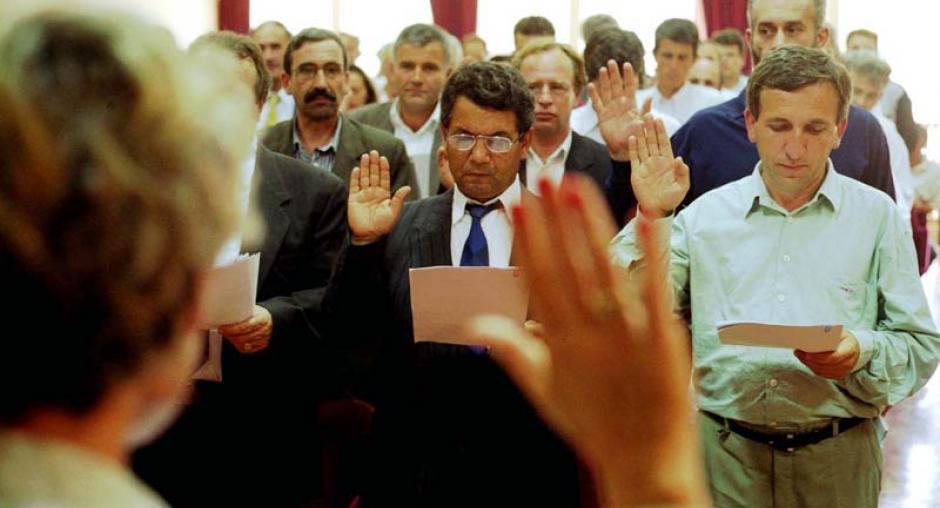Newsroom
Independence of judiciary important to Kosovo's justice system
PRISTINA 29 April 2002

The OSCE Mission in Kosovo plays a key role in the field of rule of law (Lubomir Kotek/OSCE) Photo details
PRISTINA, 29 April 2002 - The OSCE's latest overview of Kosovo's justice system has asked for assurances that international human rights standards will be further safeguarded. The report, launched today in Pristina as the fourth in a series that has covered the evolution of the judicial system in Kosovo, focuses on specific areas: the independence of the judiciary, detention, and issues of mental health.
The report acknowledges that while areas of concern remain, the foundations of a sustainable system based on human rights and access to justice have been laid. As a priority, the independence of the judiciary should be ensured as: "It gives individuals the guarantee that the judicial system possesses the mechanisms to provide legal protection, when necessaryjudicial independence guarantees governmental accountability."
Among the areas of concern are:
The report also acknowledges that the creation of the Victim Advocacy and Assistance Unit and the Judicial Integration Section, specialized sections within the Department of Justice, will have "a positive impact on the development of the justice system".
The OSCE is mandated with monitoring human rights in Kosovo, and it applies a human rights' perspective to its monitoring of the judicial system. This monitoring has been used in assisting UNMiK to create a justice system that works and is striving towards international standards.
The OSCE is working closely with Pillar I, Police and Justice, to deal with many of the issues raised in the latest report with the aim of enhancing the development of a culture of respect for human rights and rule of law.
The report acknowledges that while areas of concern remain, the foundations of a sustainable system based on human rights and access to justice have been laid. As a priority, the independence of the judiciary should be ensured as: "It gives individuals the guarantee that the judicial system possesses the mechanisms to provide legal protection, when necessaryjudicial independence guarantees governmental accountability."
Among the areas of concern are:
- lack of a systematized mechanism for ensuring that United Nations Mission in Kosovo (UNMiK) regulations comply with international human rights standards. Recommendations made by the OSCE aim to guarantee their application throughout the judicial system;
- lack of review for disciplinary decisions taken by the Kosovo Judicial and Prosecutorial Council (KJPC). The OSCE suggests that the independence of the KJPC be enhanced to guarantee institutional independence and increase the credibility and reputation of the judiciary;
- executive and legislative interference in the performance of judicial functions. The OSCE recommends enhanced autonomy of the judiciary in line with the democratic principles of separation of powers;
- extrajudicial detention orders of the Special Representative of the UN Secretary General (SRSG) and by KFOR, under the authority of KFOR Command. While the SRSG's authority has not been used over the last six months, the OSCE suggests that these extraordinary measures should now be abolished;
- detention and treatment of the mentally ill and the reluctance of courts to deal with these cases. As a priority, the draft Regulation on Deprivation and Forced Treatment be made law to set clear legal grounds. All use of detention in the mental health sector should be reviewed.
The report also acknowledges that the creation of the Victim Advocacy and Assistance Unit and the Judicial Integration Section, specialized sections within the Department of Justice, will have "a positive impact on the development of the justice system".
The OSCE is mandated with monitoring human rights in Kosovo, and it applies a human rights' perspective to its monitoring of the judicial system. This monitoring has been used in assisting UNMiK to create a justice system that works and is striving towards international standards.
The OSCE is working closely with Pillar I, Police and Justice, to deal with many of the issues raised in the latest report with the aim of enhancing the development of a culture of respect for human rights and rule of law.
